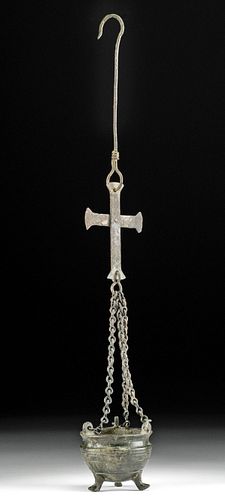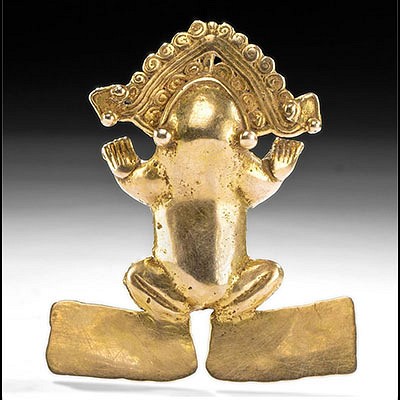Exhibited 6th C. Byzantine Bronze Incense Thurible
Lot 51
About Seller
Artemis Fine Arts
686 S Taylor Ave, Ste 106
Louisville, CO 80027
United States
Selling antiquities, ancient and ethnographic art online since 1993, Artemis Gallery specializes in Classical Antiquities (Egyptian, Greek, Roman, Near Eastern), Asian, Pre-Columbian, African / Tribal / Oceanographic art. Our extensive inventory includes pottery, stone, metal, wood, glass and textil...Read more
Categories
Estimate:
$8,000 - $12,000
Absentee vs Live bid
Two ways to bid:
- Leave a max absentee bid and the platform will bid on your behalf up to your maximum bid during the live auction.
- Bid live during the auction and your bids will be submitted real-time to the auctioneer.
Bid Increments
| Price | Bid Increment |
|---|---|
| $0 | $25 |
| $300 | $50 |
| $1,000 | $100 |
| $2,000 | $250 |
| $5,000 | $500 |
| $10,000 | $1,000 |
| $20,000 | $2,500 |
| $50,000 | $5,000 |
| $100,000 | $10,000 |
| $200,000 | $20,000 |
About Auction
By Artemis Fine Arts
Aug 13, 2020
Set Reminder
2020-08-13 10:00:00
2020-08-13 10:00:00
America/New_York
Bidsquare
Bidsquare : Fine Antiquities, Ethnographic & Fine Art
https://www.bidsquare.com/auctions/artemis-gallery/fine-antiquities-ethnographic-fine-art-5415
Features classical antiquities, ancient and ethnographic art from cultures encompassing the globe. Egyptian, Greek, Roman, Etruscan, Near Eastern, Asian, Pre-Columbian, Native American, African / Tribal, Oceanic, Spanish Colonial, Russian, Fine Art, so much more! Artemis Fine Arts info@artemisfinearts.com
Features classical antiquities, ancient and ethnographic art from cultures encompassing the globe. Egyptian, Greek, Roman, Etruscan, Near Eastern, Asian, Pre-Columbian, Native American, African / Tribal, Oceanic, Spanish Colonial, Russian, Fine Art, so much more! Artemis Fine Arts info@artemisfinearts.com
- Lot Description
Ancient Near East, Holy Land, early Byzantine Empire, ca. 6th to 8th century CE. A striking thurible, a cast-bronze censer suspended from a trio of lengthy bronze chains. The hemispherical cup is tripodal in form with three petite legs on the bottom, gentle grooves coursing around the body, and a flared rim bearing three perforated suspension lugs that each hold the bottom link of a flexible chain. Each chain is constructed from several links that stretch between the lugs and a central bronze loop attached to the bottom of a broad crucifix, and a wire hook is attached to a perforation at the top of the cross. The flared rim once had a lid with petite perforations to allow the incense smell to escape, and the chain would allow the thurible to be swung during religious ceremonies. Size (cup): 2.8" W x 2.8" H (7.1 cm x 7.1 cm); (with chain, crucifix, and hook): 20" H (50.8 cm)
This item was exhibited at the Yale University Art Museum, reference number aaw16-169.
For additional examples of Byzantine censers, please see The Metropolitan Museum of art, accession number 1999.519.10 as well as The British Museum, museum number 1994,0610.13.
Provenance: private New York, New York, USA collection; ex-private C.H. collection, Ann Arbor, Michigan, USA, acquired in 2004; ex-Royal-Athena Galleries, New York, New York, USA; ex-Jean-Alain Mariaud de Serres collection, Paris, France; exhibited in the Yale University Art Museum, 2004-2015, reference number aaw16-169
All items legal to buy/sell under U.S. Statute covering cultural patrimony Code 2600, CHAPTER 14, and are guaranteed to be as described or your money back.
A Certificate of Authenticity will accompany all winning bids.
We ship worldwide and handle all shipping in-house for your convenience.
#156491One wire hook within censer rim loops is not original to chains. Minor abrasions to censer body, with encrustations within basin, and slight bending to some chain links, crucifix, and suspension hook. Wonderful patina throughout.Condition
- Shipping Info
-
All shipping is handled in-house for your convenience. Your invoice from Artemis Gallery will include shipping calculation instructions. If in doubt, please inquire BEFORE bidding for estimated shipping costs for individual items.
-
- Buyer's Premium



 EUR
EUR CAD
CAD AUD
AUD GBP
GBP MXN
MXN HKD
HKD CNY
CNY MYR
MYR SEK
SEK SGD
SGD CHF
CHF THB
THB
















